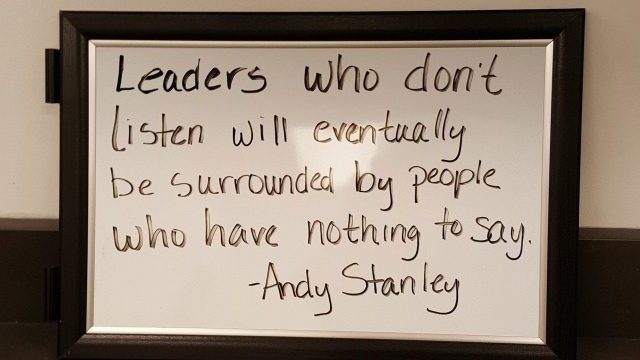Two in five CEOs fail within their first 18 months of leading an organization, according to a study published in the Harvard Business Review. One-third of chief executives from Fortune 500 companies don’t make it past three years.
Achieving goals requires your teams’ support and commitment. If your team is not on board, this could lead to you being unsuccessful in your leadership role. Here are four of the most common pitfalls that can cast you in a negative light and “turn off” your employees thereby rendering your leadership ineffective.
1) The “Marionette” Trap – The challenge for any leader is working within pre-defined parameters, yet being able to apply your own talents to achieve results. In an age of uncertainty, many leaders are yielding to this trap of just playing it safe to preserve their position and privileges. They just follow orders. They never stand up for their team or question policies. The sad part is your employees are listening and seeing everything and are murmuring behind your back. If you have to be continuously directed, you are in fact a puppet.
I know of some boards who only hire managers that they can control. If your only concern is to impress top management you will be surely losing points with your employees. There must be a balance, yes, you want to impress those at the top, but what about your employees? In the end no one takes you seriously, neither the board you are trying to impress nor the employees you have ignored.
“Clients do not come first. Employees come first. If you take care of your employees, they will take care of the clients.” ~ Richard Branson
2) The “King Kong” Trap – Some leaders when they reach to the top immediately forget where they came from. These type of leaders possess a superiority complex and like to draw the distinction between management and staff. Great leaders don’t talk down to their employees or make them feel inferior. How can you motivate the troops when you are out of sight? Come down from the mountaintop and mix and mingle with your subordinates. Respect is a must. Show respect, not just for your employees, but all those you come in contact with, inclusive of the kitchen attendant, janitor, security guard…etc. Your in-house reputation will quickly spread.
Bill Nuti former CEO at NCR Corp – While the company’s revenues grew to $6.2 billion in 2013 from $6.0 billion in 2012, employees showed a strong dislike of their CEO, Bill Nuti. One current employee, while commenting on Glassdoor, wrote to upper management, “We carry your water every day, and you disrespect us every day, we’re just your minions. You put out surveys, obviously you pay no attention to them or things would begin changing.
“ You don’t build a business. You build people, and people build the business.” -Zig Ziglar
3) The “Superman” Trap – They think the organization revolves around them. Some start behaving like they are the owners of the company. This trap includes making all of the decisions solo, ignoring feedback you don’t like and taking the credit. “ Try never to be the smartest person in the room. And if you are, I suggest you invite smarter people … or find another room” ~Michael Dell. Letting your ego get ahead of you and thinking you know it all is a sure path to failure. Be generous with Reward and Recognition and “Thank Yous.” Recognize publicly. Use collaborative skills to arrive at solutions. Admit what you don’t know. Showing some vulnerability allows you to strengthen relations with your team. You’ll build trust more easily.
4) The “Taskmaster” Trap – Micromanaging and breathing down someone’s neck all the time can be very disheartening. Sometimes knowing when to step back and let your employees do their work is what they need. Micromanagement suffocates, demoralizes and kills creativity. If you hired someone, it means you believe they are capable of doing the job. Then trust them to get the job done. You don’t need to be constantly monitoring their every movement. The best ideas and advancements are a result of empowering your team. Furthermore, do you brush over your teams’ successes, automatically working towards the next goal with a bland acknowledgement? Is results your only motivator? Continuously drilling employees is a sure way to lose points. If you ignore the wins of your team, you miss a vital opportunity, to not only inspire, but build a more personal connection with your team which can give your leadership personal brand a boost.
Many leaders don’t stop to celebrate their small successes. One notable exception is Richard Branson who, at the Virgin group, integrates work and play. Richard Branson on How to Make Employees Happy – “Don’t forget to celebrate achievements and have some fun while doing so.”
Treat employees like your business depended on them!
Most businesses put customers first while employees are just secondary. Employees are the branches of a tree that makes a company grow. They are your best ambassadors. If we treat people only as the means to an end, we will never have their loyalty. Don’t just consider them as a robot on your cog-like production line. Demonstrate that you value people and they in turn, will take care of customers.




